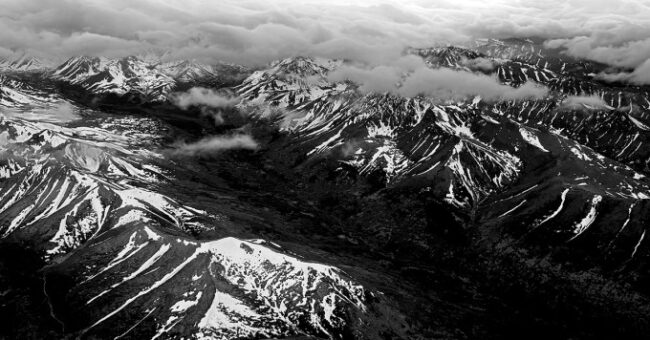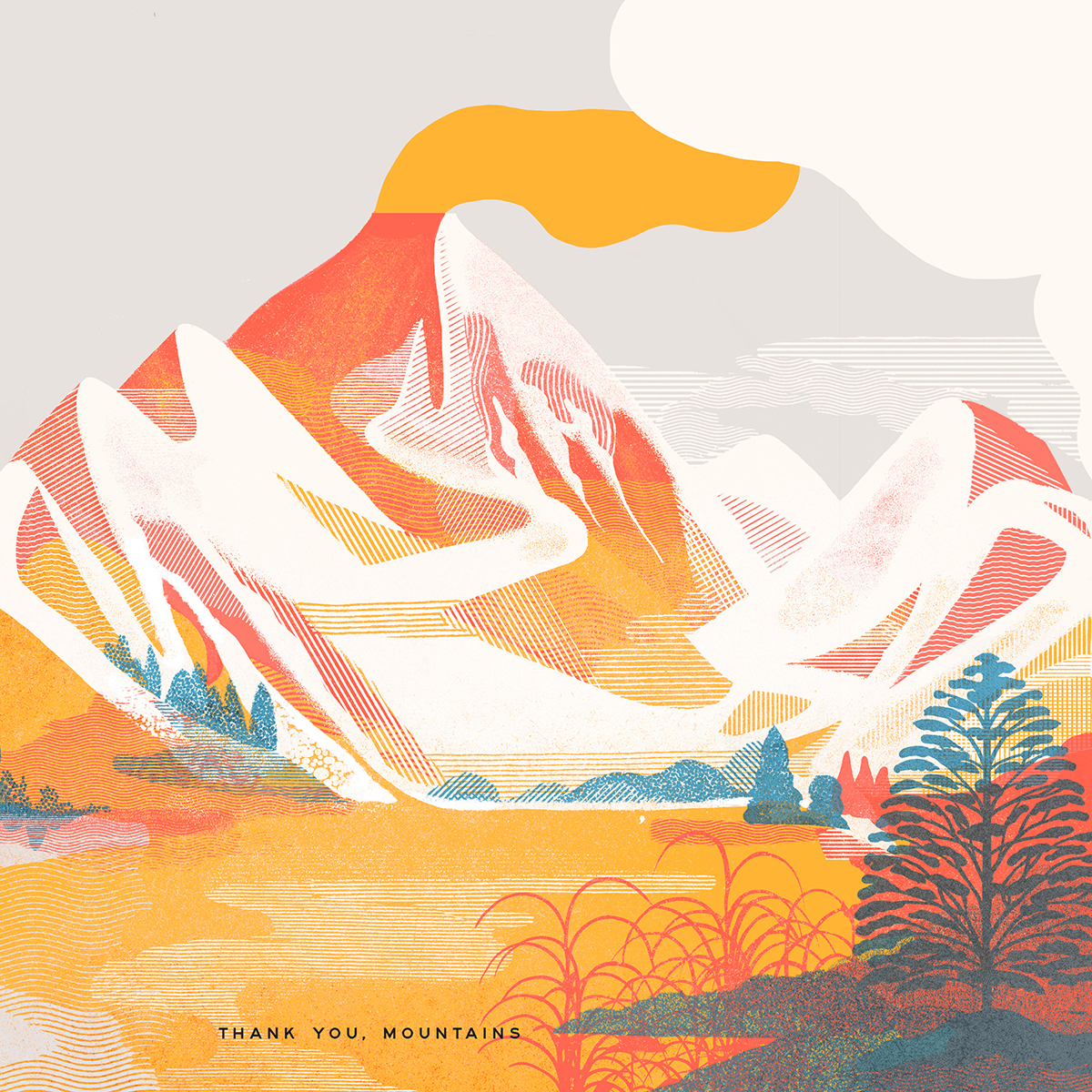
Mountains are some of our best metaphors for the mind and for the spirit, but they are also living entities, sovereign and staggering. I remember the first time I saw a mountain from an airplane — forests miniaturized to moss, rivers to capillaries, the Earth crumpled like a first draft. It is a sublime sight in the proper sense of the word — transcendent yet strangely terrifying in its vantage so unnatural to an earthbound biped, so deliriously and disquietingly godly.

Even from ground level, mountains overwhelm our creaturely frames of reference, confuse our intuitions of scale and perspective, belie the illusion of stability with which we walk through the world. Mary and Percy Shelley, crossing Europe on foot and on mule in their runaway love, one of them with a sprained ankle and the other pregnant, could barely comprehend the Alps when they first emerged from the horizon. “This immensity staggers the imagination,” they wrote in their joint journal, “and so far surpasses all conception that it requires an effort of the understanding to believe that they are indeed mountains.”
A generation later and a landmass over, the explorer John Charles Frémont (January 21, 1813–July 13, 1890) set out for the American West, fabled land of peril and promise, his eye most keenly fixed on the continent’s most majestic mountain: the Rockies, “of which so much had been said that was doubtful and contradictory.”
In the last year of his twenties, a decade after he was expelled from college for skipping class to roam the marshy forests of Charleston and a decade before he narrowly lost the presidential election by being too overtly feminist and abolitionist, Frémont traveled hundreds of river miles and traversed a thousand miles of prairie to bow at the foot of the Rockies. He gasped:
Though these snow mountains are not the Alps, they have their own character of grandeur and magnificence, and doubtless will find pens and pencils to do them justice.
And so he did. Frémont spent a decade recounting the fourteen-month adventure in his Report of the Exploring Expedition to the Rocky Mountains, Oregon and California (public domain), replete with lyrical renderings of nature and its feeling-tones that no photograph could ever capture. (This is why Instagram will never make poets obsolete.)

In an exultant entry from the 10th of August, after a night so cold his water froze, Frémont writes:
The air at sunrise is clear and pure, and the morning extremely cold, but beautiful. A lofty snowy peak of the mountain is glittering in the first rays of the sun, which have not yet reached us. The long mountain wall to the east, rising two thousand feet abruptly from the plain, behind which we see the peaks, is still dark, and cuts clear against the glowing sky. A fog, just risen from the river, lies along the base of the mountain… The scenery becomes hourly more interesting and grand, and the view here is truly magnificent; but, indeed, it needs something to repay the long prairie journey of a thousand miles. The sun has shot above the wall, and makes a magical change. The whole valley is glowing and bright, and all the mountain peaks are gleaming like silver.
Yet over and over the beauty keeps exceeding itself in a living reminder that nature’s imagination is always greater than our own, for we are part of the imagined:
Winding our way up a long ravine, we came unexpectedly in view of a most beautiful lake, set like a gem in the mountains. The sheet of water lay transversely across the direction we had been pursuing; and, descending the steep, rocky ridge, where it was necessary to lead our horses, we followed its banks to the southern extremity. Here a view of the utmost magnificence and grandeur burst upon our eyes. With nothing between us and their feet to lessen the effect of the whole height, a grand bed of snow-capped mountains rose before us, pile upon pile, glowing in the bright light of an August day. Immediately below them lay the lake, between two ridges, covered with dark pines, which swept down from the main chain to the spot where we stood. Here, where the lake glittered in the open sunlight, its banks of yellow sand and the light foliage of aspen groves contrasted well with the gloomy pines… Proceeding a little further, we came suddenly upon the outlet of the lake, where it found its way through a narrow passage between low hills. Dark pines which overhung the stream, and masses of rock, where the water foamed along, gave it much romantic beauty.
Having so rendered the romance of the mountain with a poet’s sensibility, Frémont returns abruptly to science — our other language for reverencing reality — when his most valuable instrument shatters during the outlet crossing:
The current was very swift, and the water cold, and of a crystal purity. In crossing this stream, I met with a great misfortune in having my barometer broken. It was the only one. A great part of the interest of the journey for me was in the exploration of these mountains, of which so much had been said that was doubtful and contradictory; and now their snowy peaks rose majestically before me, and the only means of giving them authentically to science, the object of my anxious solicitude by night and day, was destroyed. We had brought this barometer in safety a thousand miles, and broke it almost among the snow of the mountains. The loss was felt by the whole camp — all had seen my anxiety, and aided me in preserving it. The height of these mountains, considered by many hunters and traders the highest in the whole range, had been a theme of constant discussion among them; and all had looked forward with pleasure to the moment when the instrument, which they believed to be as true as the sun, should stand upon the summits, and decide their disputes. Their grief was only inferior to my own.
But in that singular way nature has of lifting the spirits by quieting the self, Frémont soon transcended the all-consuming smallness of his personal disappointment by returning to the grandeur around him, of which he too was a part. He began seeing not just the variousness of the mountain’s beauties but their interdependence. A century after Alexander van Humboldt observed while roaming another mountain that “in this great chain of causes and effects, no single fact can be considered in isolation,” thus formulating the modern conception of nature half a century before the word ecology was coined, Frémont writes:
We heard the roar, and had a glimpse of a waterfall as we rode along, and, crossing in our way two fine streams, tributary to the Colorado, in about two hours’ ride we reached the top of the first row or range of the mountains. Here, again, a view of the most romantic beauty met our eyes. It seemed as if, from the vast expanse of uninteresting prairie we had passed over, Nature had collected all her beauties together in one chosen place. We were overlooking a deep valley, which was entirely occupied by three lakes, and from the brink to the surrounding ridges rose precipitously five hundred and a thousand feet, covered with the dark green of the balsam pine, relieved on the border of the lake with the light foliage of the aspen. They all communicated with each other.

Couple with Scottish mountaineer and poet Nan Shepherd’s classic meditation on mountains, then revisit Darwin’s exultant account of his spiritual experience atop a mountain and pioneering plant ecologist Edith Clements’s drawings of Rocky Mountain flowers.
donating = loving
For seventeen years, I have been spending hundreds of hours and thousands of dollars each month composing The Marginalian (which bore the outgrown name Brain Pickings for its first fifteen years). It has remained free and ad-free and alive thanks to patronage from readers. I have no staff, no interns, no assistant — a thoroughly one-woman labor of love that is also my life and my livelihood. If this labor makes your own life more livable in any way, please consider lending a helping hand with a donation. Your support makes all the difference.
newsletter
The Marginalian has a free weekly newsletter. It comes out on Sundays and offers the week’s most inspiring reading. Here’s what to expect. Like? Sign up.